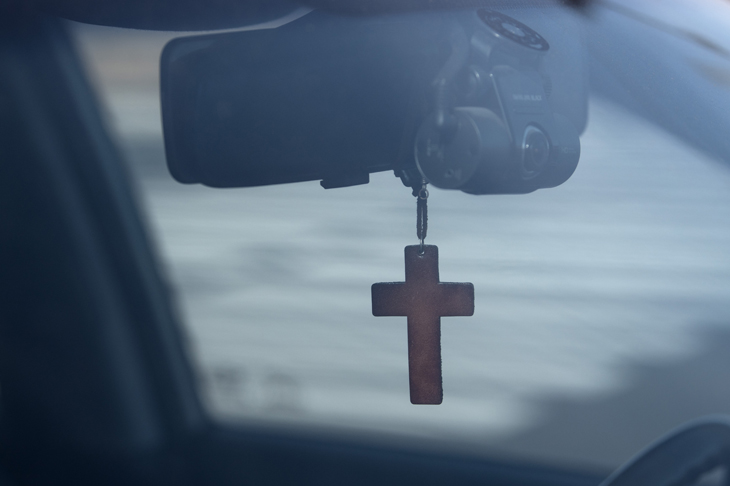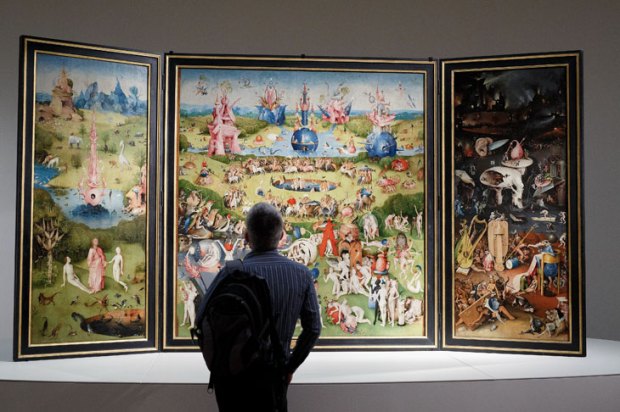If I had three years spare I would enrol in the BA at Campion College, at Toongabbie in Sydney’s west. It is Australia’s only liberal arts college and its grounds — verdant, serene, somehow intrinsically musical, scattered with prodigiously clever young people — lift the spirits. I was there last week to speak about my new book, God is Good for You, a defence of Christianity in troubled times.
Though everything about Campion is a joy, the greeting I received was a touch perplexing. ‘Some of your books have gone missing.’ Perhaps that’s a good sign, I thought, if people are pinching the tome. But no, a courier mixed up Campion with Big W at Winston Hills and delivered half of the Campion stock of my books there by mistake. Perfectly natural to confuse Campion with Big W, I suppose. In any event, that wholesome and God-fearing retailer simply opened the box and did a brisk trade, selling five in a day, before the rest were returned.
The evening at Campion was Ambrosian. A cup of tea, then a stroll around the new halls of residence recently opened by John Howard, music divine emanating from the chapel, lots of smart young folk around, another cup of tea, then record a podcast with the Campion president Paul Morrisey, dinner in a cosy library room, then the main event. This was presided over by Karl Schmude, a writer and former academic librarian (a bit like Philip Larkin, only Christian and good-humoured). Karl is an infinitely agreeable fellow but has a grave weakness for excruciating puns.
Still, you get a fairly rarefied pun at Campion. Commenting on the massive girth of the medieval theologian, Thomas Aquinas, Karl reflected: ‘One swallow does not a Summa make’. Yikes! The talk turned to rugby league, as it often does in western Sydney, and Karl quoted his father, the noted Catholic writer A. J. Schmude, who was raised in Aussie Rules country but came back from the Second World War to live in NSW. Rugby league, the elder Schmude commented after watching his first game, seemed to combine all the best qualities of boxing with all the worst qualities of World War II.
Not everything done in pursuit of my book was quite as much fun as Campion, but lots of it was lots of fun. The splendid John Roskam and the IPA hosted an evening for the book in Brisbane. Towards the end, one fellow got up and made a lengthy and somewhat disconnected speech denouncing most of the ideas in the book as far as he could make them out. ‘But,’ he said, ‘I have three friends who will be intensely annoyed by this book, so I intend to buy a copy for each of them.’ You can’t say fairer than that. Surely there’s a good marketing line in there somewhere — the perfect book for someone you want to annoy.
One of the fun things about traveling around for the book is to see which shops it figures in. Part of the inspiration for writing it was observing that at writers’ festivals and at airport bookshops there would often be not a single pro-Christian book. So finding God is Good for You in airport bookshops was a joy — for this few weeks anyway there’s a pro-God volume. Once popular culture was dominated by books about God — the novels of Evelyn Waugh and Graham Greene et al. Not any more. So I’ve lucked onto a way to be the very best in my field. Simply enter a field — mainstream secular books in defence of Christianity — in which there are virtually no other practitioners.
I am struck by the generosity of people towards this book, which reflects perhaps on its subject, certainly not on its author. One highlight was a pub function in Shenton Park in Perth organised by Steve McAlpine, a pastor at Providence church, a booming evangelical parish. Steve wrote in his brilliant blog that Christians are in exile in the West today, but not the exile of Athens, rather of Babylon.
God is Good for You is a very non-denominational book, aiming for that core of orthodoxy that C. S. Lewis called ‘mere Christianity’. So I wasn’t surprised that Steve, an Ulsterman, was characteristically kind to the book. But I was appreciative of the response in the other media companies. The Fairfax papers ran a thoughtful and generous review by Barney Zwartz. Paul Bongiorno was the soul of charm in a dialogue we had at the Canberra Writers’ Festival.
And I had a lot of good conversations about the book on the ABC. On the Conversation Hour on Melbourne’s 774, we were discussing the presence — or not — of God when a fellow guest, the brilliant Jessie Lloyd, a singer who performs the songs of the old Aboriginal missions, commented that when she and her band were singing these songs with a community there were sometimes ‘more voices’ than there were people in the hall. She also offered to come and sing at the book launch. Although Malcolm Turnbull spoke splendidly at the launch, Jessie Lloyd’s presence would have been, like her voice, angelic.
I did write one email of complaint to the ABC. Richard Glover, of Sydney’s 702 afternoons, is a writer of subtle and enthralling gifts. His Flesh Wounds is the best Australian memoir I’ve read. I almost had him, he told me, on page 51 when I discussed the statistical improbability of life and our universe. Nonetheless I complained bitterly after our interview. My gripe was that his questions were consistently so much more thoughtful and incisive than my answers!
Got something to add? Join the discussion and comment below.
Get 10 issues for just $10
Subscribe to The Spectator Australia today for the next 10 magazine issues, plus full online access, for just $10.
You might disagree with half of it, but you’ll enjoy reading all of it. Try your first month for free, then just $2 a week for the remainder of your first year.












Comments
Don't miss out
Join the conversation with other Spectator Australia readers. Subscribe to leave a comment.
SUBSCRIBEAlready a subscriber? Log in